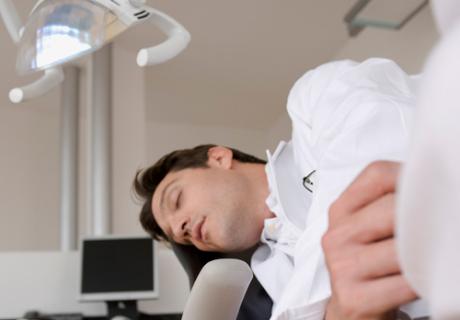10 Tips for Better Sleep
Being a dentist is hardly limited to patient care after a long day of managing your team, practice, treatment plans, finances (we could go on for days!), sleeping well is usually not on the schedule. However, maintaining your health is the only way to be the best dentist for your patients, so take it as seriously as you take your business. Continue below for some better sleep practices you can implement today.

Over caffinating, poor diet and even pets can negatively affect your sleep patterns.
Life can be stressful, but sleep shouldn’t be. Tossing and turning through the night doesn’t have to happen when there are ways to take control of your sleep. Follow these tips to wake up well rested, energized, and prepared to take on whatever life throws at you.
RELATED: More Coverage on
- Weekly Tech: Is Ozone Therapy Too Good to Be True?
- Six Key Questions to Ask During Software Demos
- Set Yourself Up For Financial Success After Graduation
1. Cut the Caffeine
Many times, coffee in the morning is what keeps America’s workforce energized. There is nothing wrong with a little caffeine, but once you’re six hours away from bedtime, it must be avoided. Even chocolate, some types of tea, and sodas should be dodged.
2. Work Out
Usually sleeping better requires more relaxation and less movement, but exercise is critical to getting better sleep. By finishing a work out three to four hours before sleeping, you will get a burst of energy to finish up your day and then be able to rest easy. Your body and mind will definitely thank you!
3. Eat Right
Overall, eating right has profound effects on your body and your sleep patterns. Eating heavy meals at night could overwork your digestive system and even cause acid reflux. Not to mention after eating a big meal, trying to sleep may be uncomfortable. Large meals should be eaten at least three hours before bed. If you’re hungry before bed, eat a light and healthy snack.
4. Dim the Lights
Setting is everything! About two to three hours before bed, dim the lights to get your body and mind in the mood to sleep. Lower light signals the brain to produce melatonin, the hormone that helps you to sleep. It also helps to sleep in complete darkness.
5. Turn off the Tech
Not only do the lights on phones and televisions affect sleep, but the stimulation keeps your brain racing. Articles, videos, shows and pictures are all reasons many people are not getting enough sleep. Turn off your phone and television before you even get to bed so your brain can rest. If you use your phone as your alarm clock, turn your phone on airplane mode so there are no temptations.
6. Booze Before Bed
Who knew a harmless glass of wine could negatively affect sleep? Alcohol can irritate breathing problems, such as snoring, and lead to increased bathroom trips that will make it difficult to sleep. It also blocks REM sleep, which is considered the most soothing type of sleep. With less REM sleep, you could wake up feeling groggy and tired. If you’re going to drink, drink alcohol three to four hours before sleep to eliminate these side effects.
7. Bed is No Place for Fur
Your beloved pet is a part of your family, but Fido could be causing you to have trouble sleeping. Dander, fleas, fur, and pollen could cause allergies while trying to sleep. Any sudden movements from your pet could even disturb your slumber. As painful as it might be, it is best if they sleep in their own space so you can wake up invigorated and have the energy to play with your pal.
8. Keep your Bedroom Quiet
Whether it’s roommates, a snoring partner, or a loud city, keeping a bedroom silent isn’t always easy. To achieve a silent space, try ear plugs, a neutral fan, or even a white noise machine to make it easier to sleep.
9. Schedule a Bedtime
Many times, staying up during weekends and sleeping in is the light at the end of the workweek, but it may be doing more harm than good. Staying up and sleeping late can shift your body’s natural clock similar to the way jet lag does. This is why it’s hard to fall asleep Sunday nights and makes Monday mornings extra hard. By keeping a consistent sleep-wake routine, your body will get used to your bedtime, leaving you feeling more rested.
10. See your Doctor
If symptoms persist for a month or more, you should see your doctor. There could be an underlying health issue, like chronic fatigue or sleep disorder, or a side effect from a medicine you are taking.